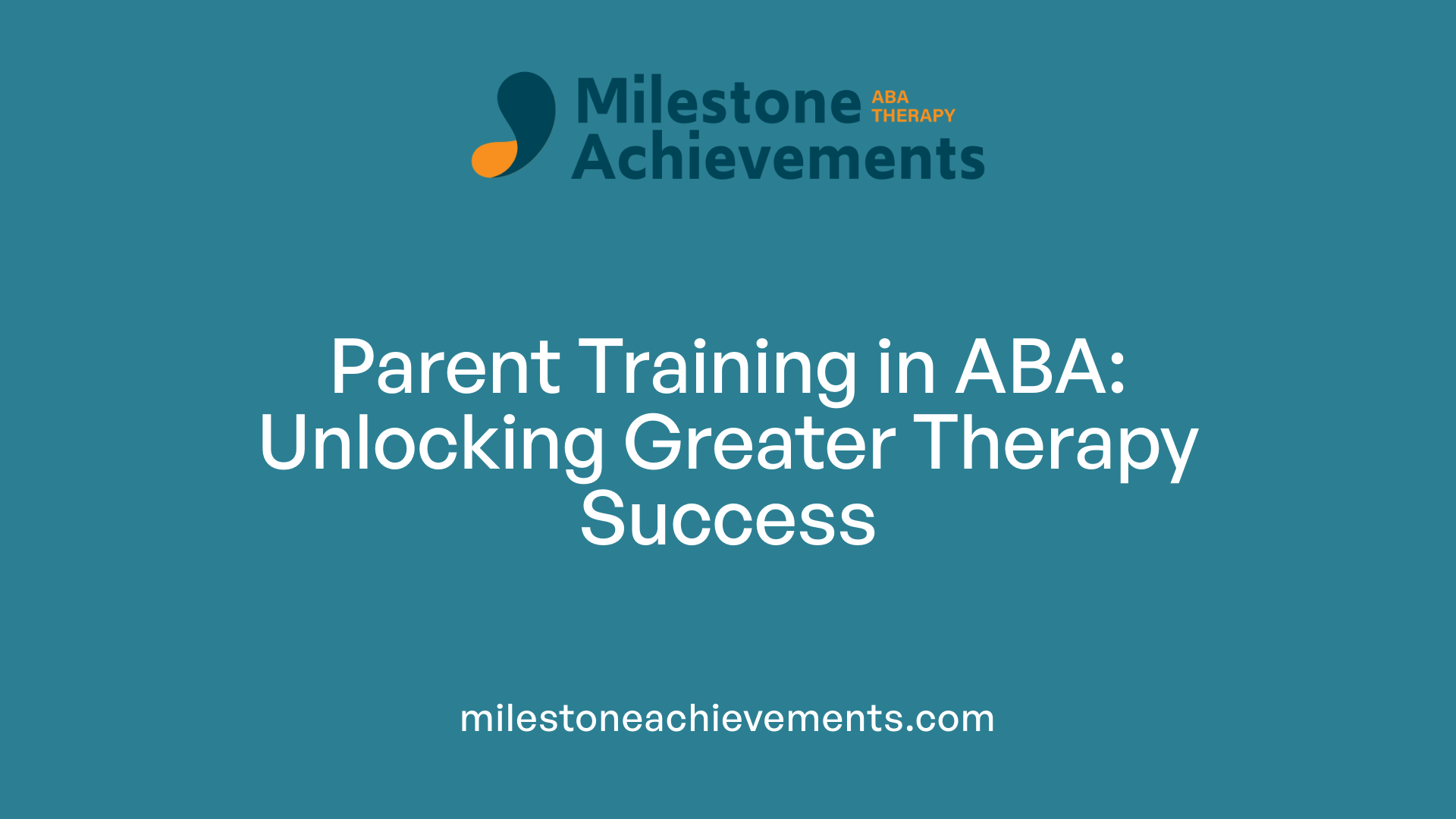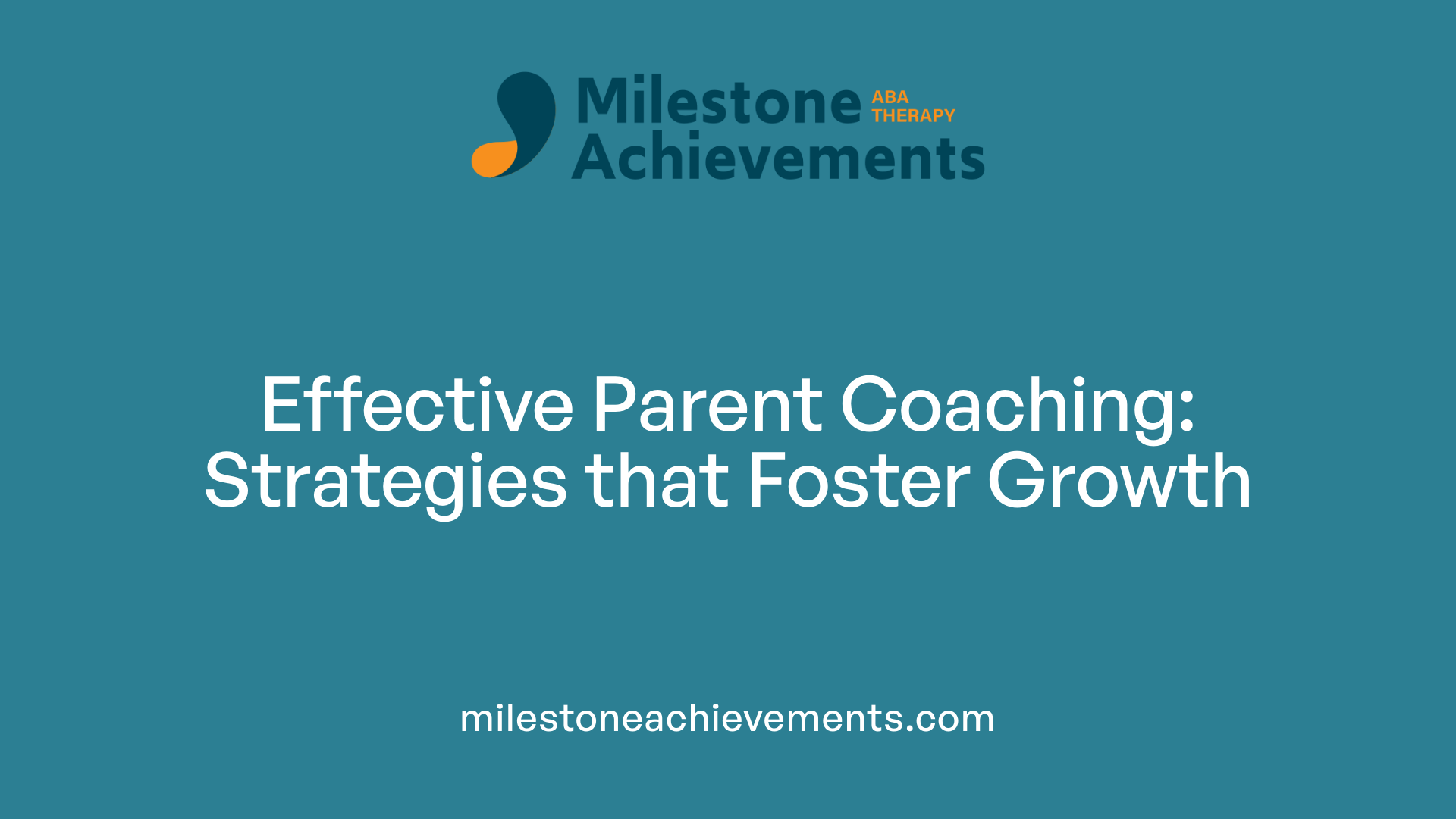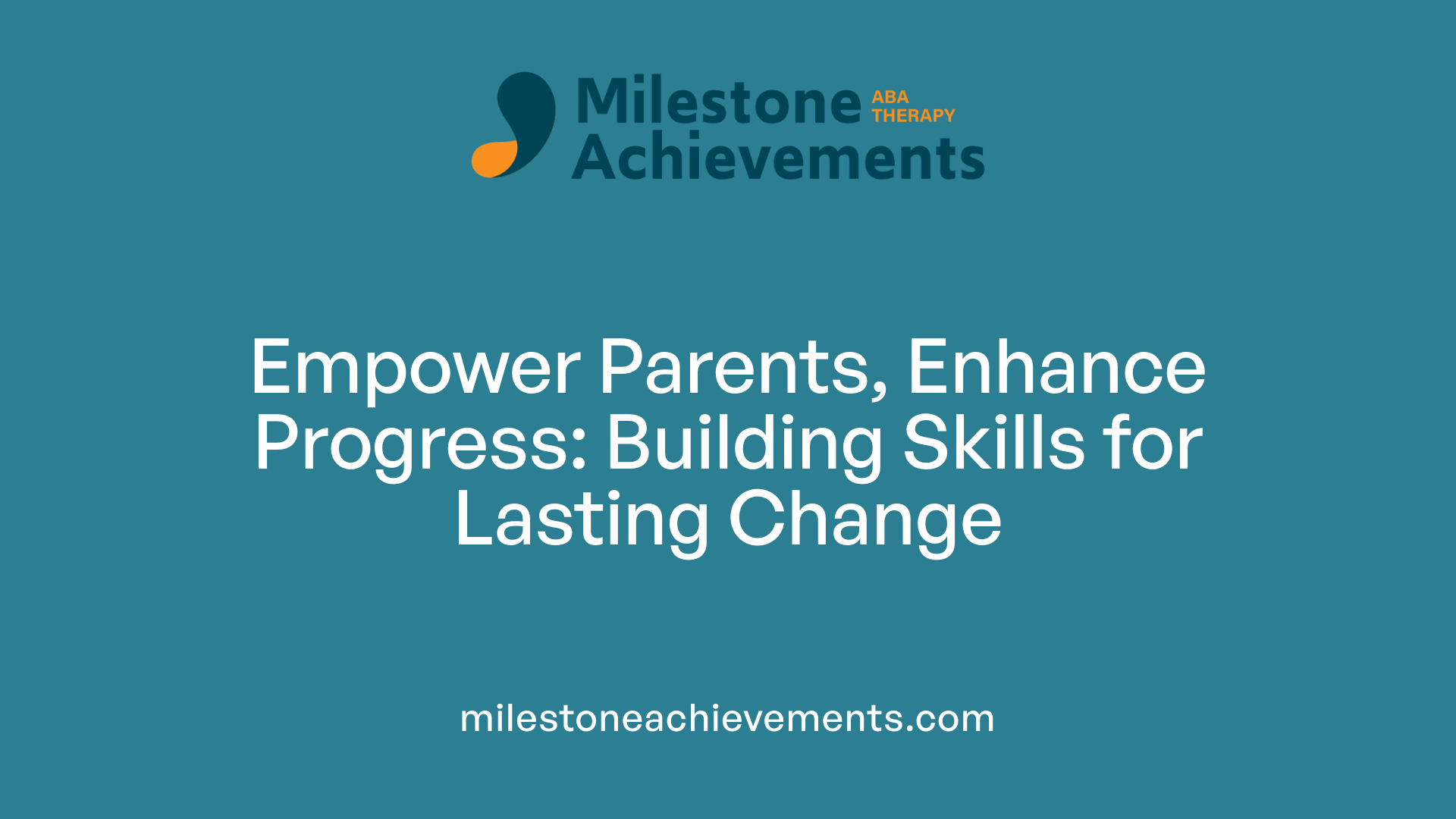
The Role of Parent Coaching in ABA Therapy for Continued Progress
Empowering Families for Lasting Impact in Autism Treatment
Understanding the Intersection of Parent Coaching and ABA Therapy
Parent coaching plays a pivotal role in enhancing the effectiveness of ABA therapy for children with autism spectrum disorder (ASD). By equipping parents with the skills and confidence to actively participate in their child's developmental journey, parent coaching ensures that therapeutic gains are maximized both within and beyond clinical settings. This article explores how parent training fosters continued progress, the strategies employed for optimal outcomes, and the current research backing these practices.
The Significance of Parent Training in ABA Therapy Outcomes

How does parent training support the effectiveness of ABA therapy?
Parent training plays a crucial role in enhancing the outcomes of ABA therapy by equipping families with practical skills and knowledge. When parents learn to apply evidence-based strategies such as positive reinforcement, visual supports, and daily routine management, they create a consistent environment that reinforces the child's progress.
Consistency across home, school, and community settings allows children to generalize new skills more effectively, leading to meaningful improvements in communication, social behaviors, and independence. Additionally, parent training fosters better teamwork and communication between families and ABA therapists. This collaboration enables tailored interventions that adapt to the child's evolving needs.
Parents who are well-informed and confident can respond calmly to challenging behaviors, reducing stress and promoting a positive home environment. This active parental involvement not only boosts the child's development but also ensures smoother execution of intervention strategies that drive long-term success.
Building Effective Collaboration Between Parents and Therapists

Why is collaboration between parents and therapists vital for ABA success?
When parents and therapists work together, they create a powerful team that supports a child's growth. This partnership ensures that strategies used in therapy are reinforced consistently at home, across different environments. Effective communication and shared goal-setting help both parties stay aligned on the child's needs, fostering a supportive atmosphere that promotes development.
Open, honest dialogue lets parents share insights about their child's routines, interests, and behaviors. Therapists can then adjust interventions based on this information, making strategies more relevant and effective. Regular updates about progress and challenges allow for timely adjustments, reinforcing the child's learning process.
How does sharing information about the child's progress help?
Providing routine progress reports enables therapists and parents to monitor achievements and identify areas needing additional focus. These updates might include data on skill acquisition, behavioral changes, or difficulties encountered. With this shared view, both can celebrate small successes, motivate ongoing effort, and troubleshoot problems early.
In turn, this continuous feedback loop helps in setting realistic, clear, and measurable goals. The therapy becomes a collaborative effort where every step is purpose-driven, tailored to the child's evolving needs.
How can interventions be personalized through collaboration?
Partnerships between parents and therapists facilitate the tailoring of interventions. By working together, they can incorporate family routines, cultural values, and specific preferences into the therapy plan. This personalization increases engagement, motivation, and the likelihood that strategies will be adopted consistently.
For example, parents might highlight certain triggers for challenging behaviors, allowing therapists to develop precise behavior management techniques. Conversely, therapists can introduce strategies that mesh well with family dynamics, making interventions more practical and sustainable.
How do communication channels support ongoing collaboration?
Establishing clear and open lines of communication—such as regular meetings, phone calls, emails, or shared logs—ensures that parents and therapists remain connected. Utilizing digital tools like parent portals or apps allows real-time updates and easy sharing of data, making collaboration more dynamic.
Active listening and mutual respect are fundamental. When both parties value each other's insights, they foster trust and commitment to the child's progress.
What are practical approaches for strengthening parent-therapist teamwork?
- Conducting regular check-ins to discuss progress and concerns.
- Collaboratively setting SMART (specific, measurable, achievable, relevant, time-bound) goals.
- Engaging parents in training sessions that include demonstrations like video modeling and role-playing.
- Celebrating milestones to maintain motivation.
- Respecting cultural differences and providing materials in preferred languages.
These strategies build a sense of shared responsibility, making parents active partners in therapy.
What are the benefits of integrated communication and joint planning?
When parents and therapists coordinate closely, interventions become more consistent, leading to better skill generalization and long-term progress. This cohesive approach helps reinforce behaviors learned during therapy in everyday situations, including social, educational, and home settings.
By working as a team, both can also address challenges more promptly and adapt strategies effectively. Ultimately, this collaboration empowers families, fosters a positive environment for the child, and enhances overall developmental outcomes.
| Aspect | Approach | Benefits |
|---|---|---|
| Communication | Regular meetings, digital updates | Keeps everyone informed and aligned |
| Goal-Setting | Collaborative, SMART goals | Clarifies expectations and progress markers |
| Data Sharing | Commercial apps, logs | Facilitates real-time tracking |
| Cultural and Language Sensitivity | Multilingual materials, respect values | Improves engagement |
| Support Strategies | Joint training, milestone celebration | Boosts motivation and confidence |
Effective collaboration results in a nurturing, consistent, and adaptable support system designed around each child's unique needs, leading to enhanced developmental outcomes.
Strategies and Methods in Parent Coaching for Skill Development

What strategies are used in parent coaching to promote developmental progress?
Parent coaching integrates a range of techniques designed to support children's growth and skill development. Coaches start by providing psychoeducation, helping caregivers understand developmental milestones and behaviors. Demonstrating skills through modeling allows parents to see effective ways to interact with their children.
Positive reinforcement and consistent behavior management are core components, encouraging desirable behaviors and establishing routines that support learning.
Active listening and collaborative goal setting empower parents, making strategies relevant to their family context. Role-playing, scenario practice, and real-time feedback further build caregivers' confidence and competence.
The entire process emphasizes creating a structured, enriching environment that supports social, communication, and adaptive skills. Tailoring strategies to each child's needs enhances effectiveness, while ongoing evaluation and support sustain progress over time.
This approach fosters strong parent-child relationships and helps families implement practical techniques at home, ensuring learning continues beyond therapy sessions.
What is progressive ABA, and how does it inform parent coaching?
Progressive ABA is an adaptive and flexible model of Applied Behavior Analysis that emphasizes responsiveness and personalization. Unlike traditional rigid protocols, progressive ABA evolves based on the child's progress and specific needs.
It is grounded in scientific principles but promotes ongoing adjustments to strategies, making interventions more effective and sustainable. This methodology encourages active participation from parents and caregivers, providing them with personalized tools they can confidently apply.
In parent coaching, progressive ABA translates into a collaborative process where families learn to modify behavior strategies as their child's development unfolds. It supports a dynamic, goal-oriented approach that balances evidence-based practices with individual family circumstances.
This model not only enhances immediate skill acquisition but also promotes long-term independence and social functioning for children with autism, fostering a sense of ownership and empowerment among parents.
Techniques in Parent Coaching
| Technique | Description | Benefits |
|---|---|---|
| Video Modeling | Using videos to demonstrate desired behaviors and interactions. | Enhances understanding and allows parents to observe targeted techniques in realistic settings. |
| Role-Playing | Practicing scenarios through simulated interactions. | Builds confidence and practical skills in managing various situations. |
| Routines & Reinforcement Plans | Developing consistent daily routines and reward systems tailored to the child's interests. | Promotes predictability, motivation, and reinforcement of positive behaviors. |
| Collaborative Goal Setting | Working with therapists to identify specific, measurable objectives. | Ensures strategies align with family priorities and child's needs. |
| Ongoing Support & Evaluation | Regular check-ins and feedback sessions to review progress. | Facilitates adjustments, maintains motivation, and sustains gains. |
How do these methods work together?
Combining these strategies offers a comprehensive framework for caregiver education and implementation. Video modeling and role-playing make abstract concepts concrete, while routines and reinforcement strategies embed skills into daily life.
Collaborative goal setting and ongoing support foster a partnership approach, ensuring interventions remain relevant and adaptable. This synergy helps families create consistent, positive environments that support the child's development effectively.
Through tailored techniques and continuous guidance, parent coaching transforms caregivers into active partners in their child's growth, leading to meaningful and lasting improvements in social, communication, and behavioral skills.
Fostering Continued Progress Through Parent Empowerment

Why is educating and empowering parents to implement ABA principles at home so important?
Engaging parents in ABA strategies transforms their role from mere observers to active participants in their child's development. When parents understand the fundamentals of ABA, they can seamlessly reinforce positive behaviors and implement individualized strategies consistently across various settings. This consistency is vital for helping children generalize skills learned during therapy sessions to everyday life.
Training parents boosts their confidence and reduces feelings of helplessness, creating a supportive home environment where progress can flourish. Equipped with practical tools, parents can manage challenging behaviors effectively, encourage independence, and foster social and communication skills outside of clinical settings. Moreover, involving parents in intervention planning ensures that strategies are tailored to the child's unique needs, making therapy more relevant and effective.
Collaboration and ongoing communication between parents and therapists help fine-tune interventions and adapt to the child's evolving requirements. Overall, parental empowerment leads to sustainable developmental gains, benefits family dynamics, and creates a cohesive support system that extends beyond the therapy room.
Conclusion: Boosting Child Development Through Family Involvement
Empowering parents through targeted training and collaborative coaching not only enhances the direct application of ABA strategies at home but also catalyzes meaningful, long-lasting developmental progress for children with ASD. When parents are equipped with the necessary skills, they become vital partners in the therapeutic process, ensuring consistency across settings, fostering skill generalization, and reducing behavioral challenges. Ongoing research continues to reinforce the importance of parent involvement, highlighting innovative approaches like telehealth and personalized interventions tailored to each child's unique needs. Ultimately, a family-centered approach in ABA, emphasizing education, empowerment, and collaboration, paves the way for more effective and sustainable outcomes, fostering independence and improved quality of life for children and their families.
References
- The Importance of Parent Training in ABA Therapy: Empowering ...
- Combining ABA Therapy With Parent Training Programs
- How ABA Parent Coaching Bridges the Gap Between Therapy and ...
- ABA Education for Parents: 7 Steps to Coach Parents in ABA
- Innovative ABA Strategies to Engage Families in Therapy
- The Crucial Role of Parent Training in ABA: Unlocking Success ...
- Advances in Supporting Parents in Interventions for Autism ...


Partner with us on your child's journey
Milestone Achievements offers evidence-based ABA therapy to help children with autism reach their full potential. Together we’ll set meaningful goals and celebrate progress every step of the way.
Start ABA Services Today





